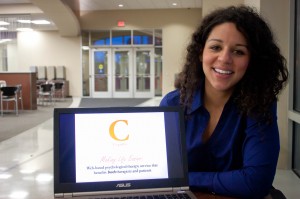Most students hope to find a job after graduation. Senior Solome Tibebu created one for herself.

Tibebu is the founder of Cognific, a service-based software that will offer mental health “homework” in a gaming format for young adult patients, as well as an analytics platform for psychotherapists.
Tibebu’s idea for Cognific originated from a frustrating experience with a therapist for an anxiety disorder she battled throughout middle school and high school.
The therapist used exposure therapy, a technique that encourages patients to face a problem head on and assigned activities to complete before the next session, which Solome called mental health “homework.”
“They just write on a little Post-It note what your mental health homework was going to be for the week…I was supposed to make sure I didn’t lose this little thing in the car as a teenager (and) if I was lucky enough not to lose (it), I was supposed to go home and do exposure therapy by myself all alone with no guidance,” Tibebu said.
Half of Cognific is the idea of making mental health “homework” a more enjoyable experience.
“The patient has resources 24/7 outside of just that hour-long appointment with the therapist – tools to improve, to get better faster,” Tibebu said.
The other half is a tracking system that will help therapists understand their patients better and make it easier to adjust the patient management plan as needed.
According to Tibebu, after the patient completes the game assignments, real time results will be sent to the therapist or health care provider. Over time, they will be able to track improvement rates.
Senior psychology major Mark Koranda thinks Cognific is “an interesting idea.”
“This could be a nice tool in the therapist’s handbag,” Koranda said.
Cognific’s journey
Tibebu began working on the idea for Cognific about a year and a half ago.
She won fourth place for Cognific in the 2010 Schulze School of Entrepreneurship’s Fowler Business Concept Challenge.
“I was just toying around with (the idea), but the competition was definitely a good kick in the butt to really sit down and develop (it),” Tibebu said.
Tibebu also got to the Minnesota Cup semifinals, another business competition.
In 2011, Tibebu won first place in the Fowler Business Concept Challenge after “working on (Cognific) all year.”
A few weeks ago, Tibebu participated in the second annual Minnesota Entrepreneur Kick-off through the Minnesota Angel Network.
“Cognific was the featured startup there…I pitched in front of a couple hundred people,” Tibebu said.
Tibebu said Professors Alec Johnson and Jay Ebben as major helpers in Cognific’s development.
Johnson said he’s “worked directly with Solome on financing (and) technology strategies.”
Tibebu has also sought guidance in the business and technology communities, and said people have been willing to help.
“I’ve gotten a lot of great feedback from them (and) a lot of support,” Tibebu said. “That’s a lesson for all college students – you’ve got to get out of this little St. Thomas bubble and go out in the community.”
Future plans
Tibebu is working with developers and said she hopes to launch Cognific a few weeks after graduation in May.
“I’ve been talking to customers, like psychologists, for weeks now and getting their feedback on how they’d like to see it,” Tibebu said.
Even though she still has some “dates and loose ends to tie up,” Tibebu plans to test Cognific at a hospital this summer.
After graduation, working on Cognific and Anxiety In Teens, an online mental health resource for youth and families affected by anxiety, will become Tibebu’s full-time job.
Tibebu also started the OutRun Anxiety 5K/10K and Wellness Expo, which will take place in Eden Prairie on July 15.
Entrepreneurship program
Tibebu said she definitely wants to “emphasize the entrepreneurship program (and) how much that’s helped.”
As Johnson put it, “We build dreams, baby! That’s what we do. I mean that seriously. This is the one place in college where it seems to me you get to come and experiment with dreams. You get to experiment, you get to play.”
Johnson said what sets Tibebu apart is not “some sort of special insight or magic Midas touch,” but rather a “very distinctive behavior pattern.”
“Solome is mature beyond her years, extremely confident and comfortable in her own skin, fearless, (has) very good communication skills, (and) her work ethic is second to none around here. She just works darn hard at it – everything she does,” Johnson said.
Senior entrepreneurship major Jenna Breen, who has known Tibebu for two years, said “if anyone could pull off (Cognific), it’s (Tibebu).”
“The first time I actually saw it was when she was going to present it to Fowler, and I just thought that it was really compelling that she was doing that because of her experience with anxiety herself,” Breen said. “It just made the idea that much more plausible that she was doing it rather than someone else.”
Johnson expects Tibebu to “be brilliant at whatever she chooses to pursue… including Cognific… She has it. Some do. Some get math, some have to learn math. Well, she gets entrepreneurship.”
Rita Kovtun can be reached at kovt1547@stthomas.edu.



Many well wishes to Solome on this venture. This is a really fantastic idea that has the potential to positively impact many people who suffer from mental health illnesses. I can’t wait to see how this flourishes over the coming months- best wishes!
Solome is awsome. Personal experience driving her idea generation then has the guts and determination to go out there and do it. Your awsome!:)